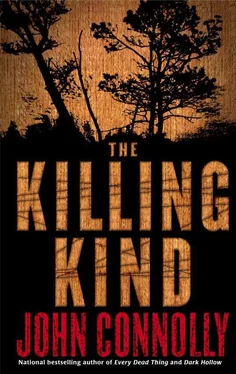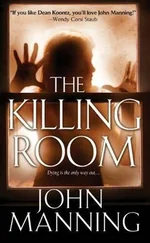And in all that they did and in all that would follow, the sound of the hybrids stayed with them, so that each night, when they returned home and tried to sleep, they would wake to imagined howls and think that they were once again standing by the shores of the lake, their hands cold and their boots thick with mud, surrounded by the bones of the dead.
That night, for the first time in many months, I dreamed, as memories of Grace and my own father followed me from waking to sleeping. In my dream I stood on a patch of cleared land with bare trees at its verge and frozen water glittering coldly beyond. There were fresh mounds of earth scattered randomly on the ground and the dirt seemed to shift as I watched, as if something was moving beneath it.
And in the trees, shapes gathered, huge, black, birdlike figures with red eyes that gazed with hunger upon the shifting earth below. Then one unfurled its wings and dived, but instead of making for the earth it flew toward me, and I saw that it was not a bird but a man, an old man with flowing gray hair and yellow teeth and nodes on his back from which the leathery wings erupted. His legs were thin, his ribs showed through his skin, and his wrinkled male organ bobbed obscenely as he flew down. He hovered before me, the dark wings beating at the night. His gaunt cheeks stretched and he spat the word at me:
“Sinner!” he hissed. His wings still flapping, he tore at a pile of earth with his clawlike feet until he revealed a patch of white skin that glowed translucently in the moonlight. His mouth opened and his head descended toward the body, which writhed and twisted against him as he bit into it, blood flowing over his chin and pooling on the ground below.
Then he smiled at me, and I turned away from the sight to find myself reflected in the waters before me. I saw my own face twinned with the moon, bleeding whitely into my naked shoulders and chest. And from my back, huge dark wings unfurled themselves and spread behind me, covering the surface of the lake like thick, black ink and stilling all life beneath.
THE SEARCH FOR SANCTUARY
Extract from the postgraduate thesis of Grace Peltier…
In April 1963, a group of four families left their homes on the eastern seaboard and journeyed north in a collection of automobiles and trucks for two hundred miles, to an area of land close by the town of Eagle Lake, twenty miles south of the border between New Brunswick and Maine. The families were the Perrsons, from Friendship, south of the coastal town of Rockland; the Kellogs, from Seal Cove; the Cornishes, from Ripley; and the Jessops, from Portland. Collectively, they became known as the Aroostook Baptists, or sometimes as the Eagle Lake Baptists, although there is no evidence to suggest that any families other than the Perrsons and the Jessops were, in fact, originally members of that faith.
Once they reached their final destination, all of the automobiles were taken and sold, the money raised being used to buy essential supplies for the families over the coming year until the settlement could become self-sufficient. The settlement land, approximately forty acres, was rented on a thirty-year lease from a local landowner. Following the desertion of the settlement, this land eventually reverted to the family of the original owner, although until recently a dispute over boundaries has prevented any development of the site.
In total, sixteen people journeyed north that month: eight adults and eight children, all equally divided between the sexes. At Eagle Lake they were met by the man they knew as Preacher (or sometimes Reverend Faulkner), his wife, Louise, and their two children, Leonard and Muriel, aged seventeen and sixteen respectively.
It was at Faulkner's instigation that the families, mainly poor farmers and blue-collar workers, had sold their properties, pooled the money made, and traveled north to establish a community based on strict religious principles. A number of other families had also been willing to make the journey, motivated variously by their persistent fears of the perceived communist threat, their own fundamentalist religious beliefs, poverty, and an inability to cope with what they saw as the moral deterioration of the society around them, and perhaps subconsciously by the tradition of adherence to non-mainstream religious movements that was so much a part of the state's history. These additional applicants had been rejected on the basis of family size and the ages and sexes of their children. Faulkner stipulated that he wanted to create a community where families could intermarry, strengthening the bonds between them over generations, and that he therefore required equal numbers of male and female partners of similar age. The families he chose were, to a greater or lesser degree, estranged from their own relatives and appeared to be untroubled by the thought of being cut off from the outside world.
The Aroostook Baptists arrived in Eagle Lake on April 15, 1963. By January 1964, the settlement had been abandoned. No trace of the founding families or of the Faulkners was ever found again.
I SLEPT LATE THE NEXT MORNING but didn't feel refreshed when I woke. The memory of my dream was still vivid, and despite the cool of the night, I had sweated under the sheets.
I decided to grab breakfast in Portland before paying a visit to the Fellowship's offices, but it wasn't until I was in my car that I noticed that the red marker on the mailbox had been raised. It was a little early for a delivery, but I didn't think anything more of it. I walked down the drive and was about to reach for the mailbox when something lithe and dark scurried across the tin. It was a small brown spider, with an odd violin-shaped mark on its body. It took me a moment or two to recognize it for what it was: a fiddleback, one of the recluses. I drew my hand away quickly. I knew that they could bite, although I'd never seen one this far north before. I used a stick to knock it away, but as I did so another set of thin legs pushed at the crack of the mailbox flap, and a second fiddleback squeezed its way out, then a third. I moved around the mailbox carefully and saw more spiders, some creeping along its base, others already rappelling slowly to the ground on lengths of silken thread. I took a deep breath and flipped the mailbox catch open with the stick.
Hundreds of tiny spiders tumbled out, some falling instantly to the grass below, others crawling and fighting their way across the inside of the flap, clinging to the bodies of those below them. The interior was alive with them. In the center of the box itself stood a small cardboard packing crate with airholes in its side, spiders spilling from the holes as the sunlight hit them. I could see dead spiders lying curled in the crate or littered around the corners of the mailbox, their legs curled into their abdomens as their peers fed on them. I backed away in disgust, trying not to think of what would have happened had I thrust my hand unthinkingly into the semidarkness.
I went to my car and took the spare gas can from the trunk, then retrieved a Zippo from the glove compartment. I sprinkled the gas both inside and outside the mailbox, and on the dry earth surrounding it, before lighting a roll of newspaper and tossing it in. The mailbox went up instantly, tiny arachnids falling aflame from the inferno. I stepped back as the grass began to burn and moved to the garden hose. I attached it to the outside faucet and wet the grass to contain the fire, then stood for a time and watched the mailbox burn. When I was content that nothing had survived, I doused it in water, the tin hissing at the contact and steam rising into the air. After it had cooled, I put on a pair of calfskin gloves and emptied the remains of the spiders into a black bag, which I threw in the garbage can outside my back door. Then I stood for a long time at the edge of my property, scanning the trees and striking at the invisible spiders I felt crawling across my skin.
Читать дальше












